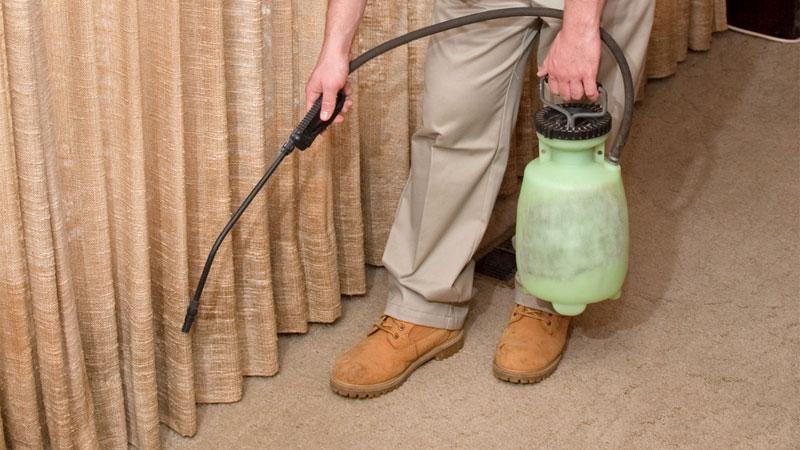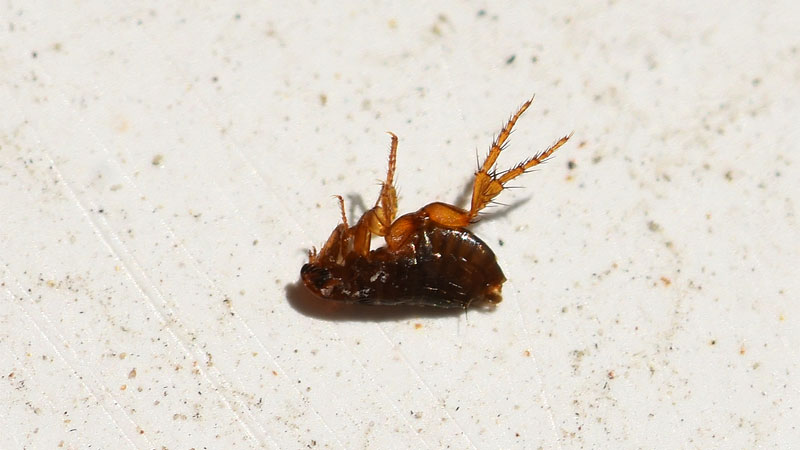Fleas are one of the most common household pests, but we often fail to take them seriously.
The adult fleas you see are only 5 percent of the total flea infestation, and there are many types of fleas out there that prefer different hosts.
A bigger problem is that people are reluctant to hire a professional exterminator even when they have a severe infestation.
But just how much does a flea exterminator cost, and when does it become important to hire one? Let’s look at the extermination process in more detail.
Read Also: Average Exterminator Prices for 20+ Pests
What is the Average Cost of a Flea Exterminator?
This is a complicated question, because every situation is a little different. However, current costs across the US tend to range from $75 to $400 according to a 2022 HomeAdvisor survey.
Various factors that go into the final cost include:
- Size of the home
- Intensity of the infestation
- Local cost of living (Californians will generally pay more than Ohioans, for example)*
- Treatment method used
*Here in Florida, getting an exterminator for fleas became very expensive in 2022 due to how many people were moving into the state.
Some Floridians reported paying as much as $700 in March 2022!
Thankfully, the price has become stable again and 2023 prices are once again in the national average, with Homeyou reporting Pensacola prices ranging from $229 to $334.
See Also: Average Cost of a Wasp Exterminator
What the Cost Includes
When you hire an exterminator, you’re not just paying them for a one-and-done treatment.
In fact, the cost of flea extermination services is a package deal. Here’s what it normally includes:
Initial Inspection
This is often a free service because it allows pest control companies to determine the type and level of infestation.
A skilled exterminator will check everything from pet bedding and your bedding, to cracks and crevasses.
They’ll check for the presence of flea dirt, flea eggs, and other signs of an active infestation.
More importantly, they can make sure it’s not just a similar critter and those are actually flea bites you’ve seen.
Once the inspection is over, they’ll give you a more exact price and a plan of action.
Initial Treatment
Flea pupae are resistant to most forms of treatment, meaning a good exterminator service will plan for multiple treatments unless they use a drastic measure.
The most common treatment is pesticidal sprays.
An exterminator is allowed to use chemicals that are heavily regulated and are far more effective than the best commercial flea foggers out there.
In more extreme cases, they may resort to tenting.
Tenting means sealing the entire house and applying high heat to kill all flea life stages.
The equipment is very expensive to use, but will almost always eliminate all traces of the infestation in one attempt.
Follow-Up Treatments
In most cases, pest control services will include at least one additional round of treatments to ensure the larvae are also killed.
This is more common in severe flea infestations.
Depending on your contract, the company may also be required to come perform additional treatments at no additional cost if the fleas come back within a certain period of time.
Follow-Up Visit
Finally, a professional flea exterminator will return after the treatment to check for any remaining signs of fleas.
They’ll also discuss preventative measures to help you avoid future infestations.
Hiring a Flea Extermination Company
Before retiring, one of our two founding Morgans had spent 18 years working in pest control.
During that time, he often got calls from people who hired an exterminator that didn’t do a good job, leaving them with a big bill and the need to do everything all over again.
He compiled a list of 10 vital questions to ask any pest control company before hiring, which I’ve listed below:
#1 – How long has your company been in business?
Sometimes you’ll find a brand new company staffed or owned by a seasoned veteran (see #2). However, it’s usually best to hire a company that’s been in business for a long time.
Not only does this help show they have more experience, but it also suggests they’ve been upgrading their equipment over the years.
It’s also important to note that a company that does poor work usually doesn’t last very long.
#2 – Do you have referrals or testimonials?
This is perhaps the extermination equivalent of the First Commandment.
Even the newest professional pest control company will have at least some feedback. In many cases, these companies were founded by veterans who will have feedback from their prior employer.
Any company worth their salt will give you both the good and bad feedback without question.
#3 – Are you licensed, bonded, and insured?
If referrals are the First Commandment, this is the Second.
Professional extermination requires the use of highly regulated equipment and pesticides. It also includes the need for specialty licenses that allow a company to handle endangered or protected species, among other things.
The exact requirements to get and renew a license can vary from state to state, so they will need a license to practice in the state you live in.
Furthermore, a bonded and insured company accepts liability for any damages they cause to your home. These companies will generally cover the cost of repairing walls or other structural damage needed to get to the source of the infestation.
You probably won’t have damage for flea treatments, unlike when treating carpenter ants, mice, termites, or wasps in your walls. However, that doesn’t mean accidents can’t happen, so it’s best to ensure they’re covered.
#4 – Do you offer a service guarantee?
Morgan says this is one of the biggest red flags to watch out for. A company that doesn’t guarantee their flea extermination process can do a sub-par job, take your money, and run.
Unless you want to hire multiple companies to do one job, make sure the one you hire provides a service guarantee. These are especially important because they ensure no hidden flea removal costs if the company has to return.
In an age where superbugs are becoming increasingly common, chemical insecticides are becoming less effective. Professionals will often use a combination of chemical treatments to reduce this risk.
Keep in mind, a limited service guarantee for something like fleas isn’t unheard of, since they’re so common. In such cases, make sure the guarantee is for more than one year or the company has included multiple visits to ensure no eggs survive.
#5 – Do you offer your quotes in writing?
There’s an old adage that says you should always get it in writing, and this is doubly true of hiring something as expensive as pest control specialists.
Our other Morgan, Morgan K., says he remembers a time when a handshake meant something. Unfortunately, a handshake or verbal agreement means nothing in court these days.
Make sure all quotes and all potential hidden fees are clearly written before signing anything.
Remember, it’s not uncommon for a company to lowball their estimates and sneak in hidden fees later, so be sure they’re going to stand by their quotes. This will also protect you in the rare chance you have to take them to court over a breach of contract.
#6 – What is the recommended treatment plan?
You can often tell the quality of a company with this question.
- A poor company will go in blind.
- Good companies will have a few options they want to try.
- A great company will have an entire battle plan as if they’re going to war (which pest control technically is).
By providing you with a solid plan of action before your first treatment, the exterminator is proving they know what they’re doing.
The last four questions expand on this one and should make the difference between a potential exterminator service and a hired one.
See Also: What Does a Bed Bug Exterminator Charge?
#7 – How do you determine the treatment method?
The only dumb question is the one you don’t ask, and this one’s important. A quality company will be able to explain not only what treatment they feel is best but why that treatment is necessary.
Some of the factors they should include in their recommendation include:
- Severity of infestation
- Whether this is a recurring pest problem for you
- Treatment effectiveness for all life stages
- Any applicable regulations
The best pest control companies will balance cost and effectiveness to ensure you’re not stuck with any unnecessary costs but still get the best possible service.
#8 – What chemicals do you use?
Morgan says this is a huge red flag question.
Any company who isn’t willing to tell you which chemicals they use may be using chemicals that are dangerous or no longer work.
The best companies will explain exactly what chemicals they use, what they do, the risks, and their effectiveness – usually without any prompting.
If they didn’t offer you this information on their own. be sure to ask. And if they refuse to answer, move on to the next company and don’t look back.
#9 – Are the treatments safe around people and pets or will you have to stay somewhere?
This is a really important part of the treatment plan and hopefully were already explained.
Many common chemical treatments can be harmful to pets, meaning you may need to temporarily remove them until treatment is over.
It may also be necessary for your family (and houseplants) to stay at a hotel or with a friend during treatment, which is an additional expense beyond the exterminator fees.
Additionally, it might be necessary to bring in a professional house cleaning service to take care of any chemical residues – another additional fee.
Be sure to let the exterminator know about any species of pets in your home during the initial consultation.
This is becoming more important with fleas because scientists are discovering new methods to deal with different species of flea. In the near future, exterminators may offer cat flea treatments that are different from human flea treatments, for example.
#10 – Do you perform follow-up treatments?
This final question is one that often weeds out the bad eggs.
A company that has passed all previous questions should give a resounding yes to this question. It’s proof that they stand by all guarantees and claims they’ve made during the interview.
By asking this question last, you’ll be able to catch scammers in the act.
Remember, any good pest control company will put everything in writing, and the flea pest control cost will include some form of service guarantee.
A company that can’t confirm everything they’ve already said is one you should never hire.
DIY Flea Extermination vs Professional Services
RMC was founded by two professionals in different pest-related fields.
This combined experience is why we’re able to tell you when you need to hire a professional versus when you can probably handle a pest problem yourself.
We’re big fans of DIY methods here, and have discussed many popular methods in detail, such as dish soap, lemon juice, rubbing alcohol, and steam cleaners vs vacuum cleaners.
Some of these methods work and some don’t.
The level of flea infestation, presence of secondary flea infestation areas, type of treatment used, and type of fleas can all play a role in DIY flea removal effectiveness. The more severe your infestation, the more likely you’ll need to hire an exterminator.
Also, keep in mind that even DIY chemical options, such as flea bombs, may not be effective enough. Many home chemical treatments have also been found to be dangerous to your pets.
Don’t be afraid to seek help when it comes to the health and safety of your two and four legged family.
Flea Health Risks
Let’s finish off by talking about an elephant in the room: why fleas are actually dangerous.
We now know the rat flea was responsible for spreading the bubonic plague, and all fleas can transmit various diseases.
A moderate infestation can cause anemia or even kill kittens, and flea bites on young children can cause illness.
Human fleas are also becoming more common and can infest hair just like lice. These can lead to such ailments as flea allergy dermatitis and other skin irritations or even hair loss.
There are many ways to reduce the risk of fleas, such as flea baths and chemical sprays.
But once they’re in your home, you need to deal with them quickly, because female fleas can lay up to 500 eggs per day, depending on the species.
- How to Identify Skunk Poop (With Pictures) - April 1, 2024
- You Really Don’t Need That Opossum Trap - January 4, 2024
- How to Set a Mouse Trap Without Getting Hurt - December 28, 2023



